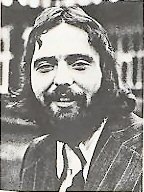

COHSE Officers January 1975 (at Beatrice Webb House, Dorking

Bob Quick newly appointed officer
A web site dedicated to the study of The Confederation Of Health Service Employees (COHSE) and National Asylum Workers Union (NAWU), National Union of County Officers (NUCO)including the Guild of Nurses. The site also notes the positive role COHSE, NUPE & NALGO Nurses played in the formation of UNISON Nursing Sector, the premier nursing union

 Robert Quick, Regional Secretary with COHSE banner of South Yorkshire and East midlands Region 12, Made by Red Wedge, Brighton Red and Gold
Robert Quick, Regional Secretary with COHSE banner of South Yorkshire and East midlands Region 12, Made by Red Wedge, Brighton Red and Gold COHSE Banner Cymru Region 10 - Wales made by Dragon Banners Yorkshire. COHSE banner Unveiled by Hector MacKenzie COHSE General secretary Cardiff 1991.
COHSE Banner Cymru Region 10 - Wales made by Dragon Banners Yorkshire. COHSE banner Unveiled by Hector MacKenzie COHSE General secretary Cardiff 1991.
 Bob (Robert) Quick
Bob (Robert) QuickPioneering nurse Jim Quick will be remembered as a vetran trade unionist and life-long Socialist. He died October 4th 1997
My farther began his working life as a welder at the Camel Laird Shipyards, Birkenhead. He was 30 when the NHS was about to be created and so wanted to be a part of the socialist vision of a-hew society that he applied to train as a psychiatn'c nurse.
Transferring his membership from the boitermakers' union, he became a founding member of the newly formed union COHSE. He soon needed COHSE's support — the superintendent at the Deva, the
But his boldness impressed local union officials and he was elected COHSE branch chair— fairly unusual for a student nurse
He qualified as an RMPA (Royal Medico-Psychological Association) in 1948 and worked in
As an active member of the Labour party for many years, he was delighted to see
Three of my father's four sons are nurses and Unison (and former COHSE) members. He will be remembered by his family, former comrades and colleagues as a pioneering nurse, a committed trade unionist, a life-long socialist and a passionate defender of the NHS.
Robert Quick is
COHSE historian Mick Carpenter stated
Jim Quick as a charming man and a progressive who sought to take COHSE into the modem era while I remaining true to its principles.
In the 1950s and 60s he embraced the new philosophies of care that took mental health out of the asylum era. He also took a courageous stand on unpopular issues such as racism against nurses from abroad. The present generation of nurses needs to acknowledge the debt they owe to men like Jim.
Nursing Times 22 October 1997
